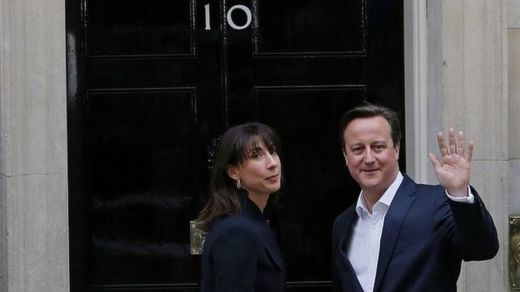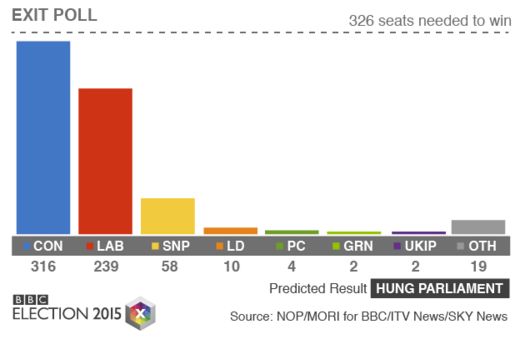
David Cameron says he hopes to govern for all of the UK as a BBC forecast gives the Tories 329 seats - enough to form a slender majority in the Commons.
His party made gains in England and Wales, including taking Ed Balls' seat.
Two senior Labour sources have told the BBC that Ed Miliband is expected to stand down later after Labour was all but wiped out by the SNP in Scotland.
The Lib Dems are heading for as few as eight MPs, with Vince Cable, Ed Davey and Danny Alexander losing their seats.
The BBC forecast, with 635 of 650 seats declared, is Conservative 329, Labour 234, the Lib Dems eight, the SNP 56, Plaid Cymru three, UKIP one, the Greens one and others 19.
The Conservatives are expected to have won a 37% share of the national vote, Labour 31%, UKIP 13%, the Lib Dems 8%, the SNP 5%, the Green Party 4% and Plaid Cymru 1%.
In other election developments:
- Ed Miliband is expected to make a statement about his own future later after what he said was a "difficult and disappointing" night for Labour
- Following a recount, Shadow Chancellor Ed Balls lost his Morley and Outwood seat to the Conservatives by just over 400 votes
- Nick Clegg has held on to his Sheffield Hallam seat but said it had been a "cruel and punishing night" for his party and he would be making a statement on his future later
- George Galloway, who was reported to the police forretweeting an exit poll before voting ended, has lost to Labour in Bradford West
- Scottish Labour leader Jim Murphy and shadow foreign secretary Douglas Alexander have lost their seats to the SNP
- UKIP polled strongly in the North of England and Douglas Carswell has retained his Clacton seat but Mark Reckless has lost his seat and Nigel Farage could fail to win Thanet South
- Former Lib Dem leader Charles Kennedy lost his seat to the SNP in Ross, Skye and Lochaber
- Conservative minister Esther McVey has lost Wirral West to Labour
- The Green Party is predicted to get one seat after Caroline Lucas retains the Brighton Pavilion constituency she won in 2010
- With 16 seats left to declare, turnout is expected to be 66%, marginally up on 2010
Mr Cameron all but declared victory in a speech after being returned as MP for Witney, in which he set out his intention to press ahead with an in/out referendum on Britain's membership of the European Union and to complete the Conservatives' economic plan.
My aim remains simple - to govern on the basis of governing for everyone in our United Kingdom," he said.
"I want to bring our country together, our United Kingdom together, not least by implementing as fast as we can the devolution that we rightly promised and came together with other parties to agree both for Wales and for Scotland.
"In short, I want my party, and I hope a government I would like to lead, to reclaim a mantle that we should never have lost - the mantle of One Nation, One United Kingdom. That is how I will govern if I am fortunate enough to form a government in the coming days."
Mr Cameron has returned to Downing Street with his wife Samantha and is expected to hold an audience with the Queen later on Friday.
Chancellor George Osborne said the Conservatives had been "given a mandate to get on with the work we started five years ago" and would follow the "clear instructions" of the British public.
However, Work and Pensions Secretary Iain Duncan Smith acknowledged that governing with a small majority was difficult.
"Whatever else we now do we keep it simple, we keep it focused and we absolutely stick to our manifesto commitments," he told the BBC.
He said the party would deliver an EU referendum as it was a "red line".

Analysis by Nick Robinson
Not since the fall of Thatcher or the Blair landslide has there been a political moment quite like this one.
Personal triumphs for David Cameron and Nicola Sturgeon will not just reshape British politics but could perhaps reshape the future of the United Kingdom itself.
Bitter disappointment for Ed Miliband and a political disaster for Nick Clegg may lead to both men quitting, and is sure to lead to months of soul searching for their parties as they mourn the loss of some of their most famous faces - felled by a brutal electoral firing squad.
If UKIP's Nigel Farage fails to win his seat, as many expect, he promised too that he would resign. His party amassed millions of votes in England, more than the SNP in Scotland, but they have struggled to convert them into seats.
The future, though, belongs to David Cameron who defied all those - including at times himself - who doubted that he could ever increase his party's support.

Speaking in Doncaster, where he retained his seat, Labour leader Ed Miliband said; "Clearly this has been a very disappointing and difficult night for the Labour Party.
"We haven't made the gains we wanted in England and Wales and in Scotland we have seen a surge of nationalism overwhelming our party."
He said the next government had a "huge responsibility" and a difficult task to "keep our country together".
After his own defeat, one of the most surprising results of the night, Mr Balls said he had a "sense of sorrow" about his party's disappointing performance but he was "confident that Labour would be back" as a "united and determined" political force.
Mr Cameron looks like he will form a majority Conservative government, without the need for a coalition or the formal support of other parties.
The finishing line needed to form an absolute majority is 326, but because Sinn Fein MPs have not taken up seats and the Speaker does not normally vote, the finishing line has, in practice, been 323. In this election, Sinn Fein kept four seats.
Labour has been hammered in Scotland by the SNP, with Nicola Sturgeon's party seizing 56 of the nation's 59 seats.
Jim Murphy, leader of the Scottish Labour Party, and shadow foreign secretary Douglas Alexander have both lost their seats to the SNP, which is benefiting from a 27% average swing from Labour.
Conceding defeat, Mr Murphy said it had "proven hard to turn round years of difficulties with the Scottish Labour Party in just five short months".

Speaking after his result in Sheffield, Mr Clegg said: "It is now painfully clear this has been a cruel and punishing night for the Liberal Democrats.
"The election has profound implications for the country and for the Liberal Democrats.
"I will be seeking to make further remarks about the implications of this election - both for the country and for the party that I lead and for my position in the Liberal Democrats - when I make remarks to my colleagues in the Liberal Democrats later this morning when I return to Westminster."
Speaking at the start of the night, the Lib Dem election chief Lord Ashdown told the BBC: "If this exit poll is right I will publicly eat my hat."
After the scale of his party's losses became clear, Lord Ashdown conceded that the Lib Dems' own polling had been misleading and it had been a "humbling and humiliating" experience. Mr Clegg, he added, should be "given a bit of space to make his decision" about his future.
Labour has failed to make the headway it wanted in the South of England and the Midlands, failing to take its top target seat, Warwickshire North, back from the Conservatives.
Its progress in London has not been as strong as pre-election polls suggested although it did win a number of seats from other partie
Douglas Carswell has held Clacton for UKIP and it could end up in third place in the national vote share but fellow Tory defector Mark Reckless has lost his seat.
Green Party leader Natalie Bennett fell to an expected defeat in Holborn and St Pancras, finishing in third place. But the party appears to have increased its share of the vote, including in some of the big northern cities and retained Brighton Pavilion, which the party won in 2010.
A total of 650 Westminster MPs will be elected, with about 50 million people registered to vote.
There are also more than 9,000 council seats being contested across 279 English local authorities.
Mayors will also be elected in Bedford, Copeland, Leicester, Mansfield, Middlesbrough and Torbay.
0 comments:
Post a Comment